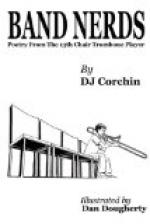DONOHUE. Young man, don’t be a fool. I’m sorry, but it’s too clear.
ROSALIE (breaking away from her daughter and moving to DONOHUE C.). Clear—how is it too clear? Inspector, you are never going to accuse my little girl of a thing like that?
DONOHUE (C.). She was next to him; she had only to free one hand and strike, and then take his hand again!
ROSALIE. There was something else she had to do before she could ever do that. She had to have murder in her heart.
DONOHUE. Well?
ROSALIE (turns suddenly; seizes her daughter by the hand, turns her to him. ROSALIE stays between DONOHUE and HELEN). Look at ’er. Look in ’er eyes—look at the face of ’er. Is there murder there? ’Ave you not eyes in your ’ead.
(DUNN enters from L.)
DUNN. It’s not on either of them.
DONOHUE. I know where it is. Tell the matron she’ll find the knife on this girl.
ROSALIE (to DONOHUE C.). Inspector, I will tell to you anything I know, only keep your hands off my little girl. I did come ’ere like you say, and when I see my little girl I lose my ’ead. I tried to save ’er and I ’ave made it worse. You ’ave looked at ’er, the poor young thing that would not ’arm a fly, and you think she could do a thing like that.
DONOHUE. Yes.
ROSALIE (still crying bitterly). Then, Inspector Donohue, you are a damn fool, and with God’s ’elp I will prove it.
CURTAIN.
ACT III
The same SCENE half an hour later.
ROSALIE is discovered by table R.
ROSALIE. Father in ’Eaven, help me. My little girl is in terrible trouble and there is not anyone to ’elp ’er but me. She is a good girl—you know all things, you know she is a good girl. Show me the way. I ’ave been a fakir all my life. I ’ave tricked them and fooled them, but I ’ave never meant to ’arm a soul, I ’ave never done ’arm to any person. And there is a power. It ’as come to me before, a power that I could not understand. I felt it, and I showed it. Oh God, give it to me again. Do this for my little girl, for the sake of your Son. Amen.
(Turns and goes up stage and then to the window at R. She pulls up the blind and raises the window. The light comes up from the street lamp, throwing out her figure in strong silhouette, and showing a square patch of light on the ceiling. In the C. of this patch, sticking point up in the heavy wooden panelling, can be seen the knife. ROSALIE stands for a few moments looking out at the night. DONOHUE enters down L. He turns on the lights from the switch below the door down L.)
DONOHUE (crosses to L.C.). Who turned off the lights?
ROSALIE (at window R.). I did, sir.
DONOHUE. Why?




